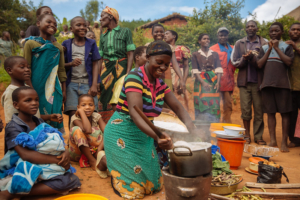5 Causes of Human Trafficking in Malawi
 “After feeling pity with my situation, my friend asked [me] to go where she works. Upon reaching there, I was disturbed to see that it was sex work. I could not object because I needed money.” According to the Voice of America (VOA), that was the reason 17-year-old Hilda became a victim of sex trafficking after the death of her parents. Unfortunately, the wish to escape poverty fuels human trafficking in Malawi.
“After feeling pity with my situation, my friend asked [me] to go where she works. Upon reaching there, I was disturbed to see that it was sex work. I could not object because I needed money.” According to the Voice of America (VOA), that was the reason 17-year-old Hilda became a victim of sex trafficking after the death of her parents. Unfortunately, the wish to escape poverty fuels human trafficking in Malawi.
Five Reasons for Human Trafficking in Malawi
Located in Southeastern Africa, Malawi spans over 45,000 square miles and has an estimated population of 19 million. Although the government passed the Trafficking in Persons Act in 2015, human trafficking in Malawi remains rampant for many reasons, including Malawi’s extreme poverty, cultural practices and lack of law enforcement. Of course, the effects of COVID-19 also exacerbate this problem. Here are five reasons why Malawi is a source of trafficking:
- Poverty fuels human trafficking. According to the World Bank, more than half of the Malawi population lives below the national poverty rate. In fact, as one of the poorest countries in the world, Malawi ranks 174 out of 189 countries on the United Nations’ Human Development Index. This is partly because, as a developing nation, Malawi’s main business and export continues to be agricultural products, making the nation particularly susceptible to weather shocks and climate changes.
- Food insecurity plagues Malawi. Despite record harvests, 1.1 million Malawians faced high-level acute food insecurity in 2021. The agricultural sector struggles with productivity, and there are few economic opportunities beyond farming. Together, this creates extensive rural unemployment. It also makes rural residents exceptionally vulnerable to promises of good work and pay in bigger cities—the most common ruse used for human trafficking.
- Cultural practices put girls at risk. Despite the fact it banned child marriage in 2017, Malawi still has a high child marriage rate. Long-established cultural practices drive the continuation of child marriage and sex trafficking. For example, families marry off young girls as payment for repaying debts or dowries. Another common custom called “kutomera” involves an older (and often wealthy) man choosing a young girl to be his future wife. After negotiating payment, the girl waits until she is sexually mature and then they take her to her designated husband. Also, sex traffickers recruit girls for “domestic service” but instead force the girls into marriages in which their husbands then force them into sex trafficking.
- Laws are often not enforced. In a giant step towards ending human trafficking in Malawi, the 2015 Trafficking in Persons Act criminalized human trafficking and prescribed punishments of up to 14 or 21 years in prison. The government also endorsed several international human rights treaties. These include the Maputo Protocol which obligates the government to protect women and girls from sex trafficking. Unfortunately, according to Equality Now, the Malawian government often fails to adequately enforce these laws. Furthermore, poverty fuels the high levels of corruption that still exist among numerous local officials. This means many human trafficking organizations operate without fear of the law. Even in the rare case perpetrators are apprehended, many are not held accountable through prosecution.
- The effects of COVID-19. Human trafficking in Malawi has worsened since the start of the pandemic. Before COVID-19, PSGR saw around two to three cases a week. During the pandemic, the number increased to seven cases a week, with some weeks seeing up to 10 or 15. This is because the economic downturns created by COVID-19 have exacerbated unemployment. This, in turn, makes people even more desperate to escape chronic poverty and vulnerable to sex traffickers.
PSGR: Combatting Human Trafficking
Although human trafficking in Malawi continues to be a huge issue, numerous social organizations are on the ground attempting to tackle the problem. In 2020, People Serving Girls at Risk (PSGR), a local NGO helping trafficking survivors, handled more than 600 cases of sex trafficking. Yet the Malawi Police Services only reported the arrest of 48 suspects and convicted only 30 of them. That’s one reason PSGR recently launched a six-year project to mentor sex workers to learn income-generating skills so they will become less vulnerable to sex trafficking. PSGR Team Leader Caleb Ng’omba said, “Our core purpose is to empower them with vocational and other skills that they could use to generate income to reduce their vulnerability to sex work, early marriages or child labour.”
The five causes of human trafficking listed above are no doubt serious hurdles that the Malawian government face, but the continuous effort of both the administration and the NGOs could result in significant progress in the near future.
-Emilie Zhang
Photo: Flickr
